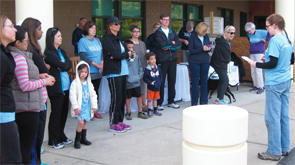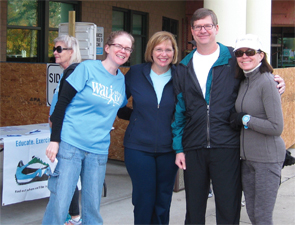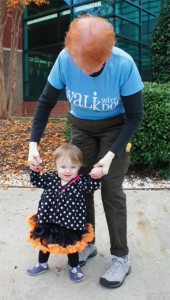
Dr. Nelson gave a presentation to the group assembled for the inaugural Walk with a Doc event in October 2015.
“No more excuses.” At least, that’s what Amanda Nelson, MD, MSCR, now tells her patients.
As a rheumatologist, assistant professor in the School of Medicine at the University of North Carolina at Chapel Hill (UNC) and clinical researcher at UNC’s onsite Thurston Arthritis Research Center, Dr. Nelson says patients often provide a litany of legitimate—and sometimes not-so-legitimate—excuses for why they don’t exercise, anything from bad weather or lacking a walking partner to, “I’ll do it tomorrow.”
However, back in October 2015, Dr. Nelson read an online article about David Sabgir, MD, a cardiologist in Columbus, Ohio, who grew so frustrated with his sedentary patients that he introduced a new program and nonprofit called, Walk with a Doc. The 11-year-old membership organization, which now supports 2,000 physicians in 40 different states, encourages physicians to lead monthly walks with their patients. Physicians pay a one-time $500 membership fee in exchange for liability insurance, pedometers and marketing materials (e.g., posters, banners, prescription pads and T-shirts that bear the organization’s logo).

Dianne Rosenbluth (background), honorary co-chair of the Osteoarthritis Action Alliance. From left: Amanda Nelson, MD, MSCR; Beth Jonas, MD, associate professor and rheumatology program director; Richard Loeser, MD: professor and director of basic and translational research at the Thurston Arthritis Research Center (TARC); and Joanne Jordan, MD, MPH, professor, division chief, rheumatology, allergy and immunology, and director of TARC.
Dr. Nelson immediately signed up and became the organization’s first member rheumatologist. Since then, she has led her patients in walking one mile near the university’s campus every month. Her goal is to spread the program to more patients with rheumatologic and non-rheumatologic conditions who would benefit from exercise. But what she especially likes about the program is that unlike research, which can take many years before patient benefits are realized, walking with patients provides immediate benefits.
Promote & Participate
Since this past October, Dr. Nelson has conducted her monthly walks from 11 a.m. to noon on the third Saturday of each month at the UNC Wellness Center at Meadowmont in Chapel Hill. She explains that anyone can use the facility’s mile path that loops around the center’s grounds.
“In addition to encouraging patients to engage in physical activity and make it part of their routine, [walking with them] also gives them an opportunity to spend some informal, non-office-based time with their providers,” she explains, adding that the mile walk typically takes 30 minutes. “We get out and walk and are able to answer questions from our patients. They informally hang out with us and with our staff. A lot of people really enjoy that.”
So far, up to two dozen people have regularly participated in the walks, which typically include physicians, researchers, staff and patients. To boost participation, Dr. Nelson is exploring unique ways to market the program. For example, she tells patients to bring along their friends and family members, both the two-legged and four-legged variety. She brings her parents who have arthritis and also her 17-month-old daughter who, surprisingly, is able to walk most of the path.
The program has also been promoted in several newsletters, including Vital Signs, a monthly email newsletter that’s distributed to employees throughout the university’s School of Medicine. The newsletter recently highlighted Dr. Nelson and the Walk with a Doc program.

Dr. Nelson’s mother and daughter both participate in the one-mile walks.
She has also partnered with the Osteoarthritis Action Alliance (OAAA), a coalition of different organizations that draw national attention to OA and is housed in the Thurston Arthritis Research Center. The organization has promoted the program on its website and in its biweekly newsletter.
“It doesn’t matter to me if it’s specifically our patients attending,” she says, adding that her outreach efforts also target individuals who access UNC’s Wellness Center or local senior center or live in the nearby retirement communities. “We’re happy to walk with anybody and talk with people about arthritis or any health topic.”
Not everyone is able to walk the full mile. She points to one woman who was concerned she could not keep pace with the rest of the group. Another rheumatologist walks with her, often turning around midway, making sure she feels safe and is not left behind or left out.
Across Boundaries
Dr. Nelson hopes the program attracts other physicians at the university, such as those who practice cardiology, internal medicine and geriatrics. Since the program’s founder is a cardiologist, she says most members nationwide are cardiologists. However, she says the program is able to cross medical disciplines and can help people afflicted with different diseases.
Meanwhile, the Walk with a Doc’s website features lecturettes, which are three- to five-minute talks that are packed with patient information and tips regarding heart disease or general medicine that doctors can present to patients before each walk. Dr. Nelson hopes to produce similar presentations that cover arthritis and other rheumatology-related conditions that can be available on the organization’s website.
Until then, she writes her own informal, short speeches that feature the general benefits of exercise, physical ailments that can improve as a result of walking, ways to incorporate physical activity into people’s daily routine and how to assess whether an individual’s activity level is minimal, moderate or vigorous.
She believes the program can be self-sustaining in the months or years ahead and will grow more popular with patients because it enriches the physician–patient relationship.
“I just want to be out there, walking every month,” says Dr. Nelson. “This is something I can do that’s fun and good for me, and has an immediate, positive impact on patients. If we even get one person to walk regularly, that’s a victory.”
Listen to Dr. Nelson talk about patient motivation and Walk with a Doc.
Carol Patton is a freelance writer based in Las Vegas.

